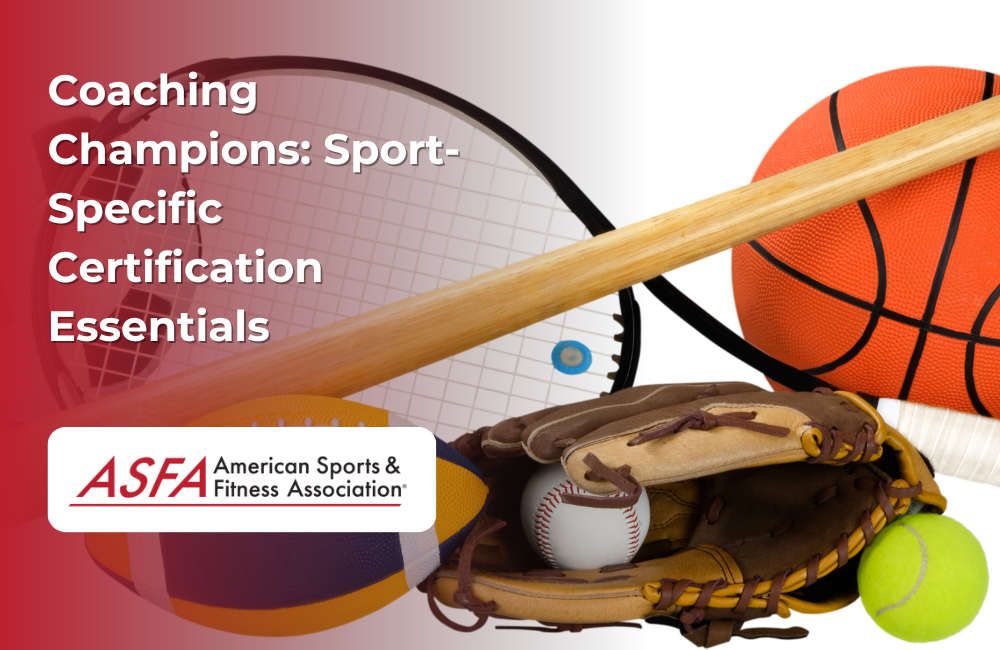Becoming a Certified Sport-Specific Coach: Your Path to Guiding Athletes to Excellence
Embarking on the journey to become a certified sport-specific coach allows you to guide and mentor athletes, helping them achieve peak performance in their chosen sports. Sport-specific training focuses on athletic performance enhancement, tailoring programs to improve skills and physical attributes relevant to each sport. This comprehensive guide outlines the essential steps, considerations, and benefits of obtaining your sport-specific coaching certification, positioning you as a trusted, effective coach in your field.
The Vital Role of a Sport-Specific Coach: Transforming Talent into Triumph
In the competitive world of sports and athletics, coaching serves as the critical bridge between raw talent and championship success. Coaching Champions: Sport-Specific Certification Essentials is your gateway into the dynamic realm of sport-specific coaching. This guide provides an in-depth exploration for those aspiring to become certified coaches, offering valuable knowledge to help you succeed in your chosen sport. Sports coaches play a significant role in helping athletes understand their sport better and improve their training methodologies.
Coaching champions is not just a profession—it’s a calling that demands expertise, dedication, and a profound understanding of the sport’s intricacies. It is the art of nurturing potential, refining skills, and instilling a winning mentality in athletes. Achieving certification in sport-specific coaching equips you with the tools, knowledge, and credibility necessary to guide athletes to reach their full potential and achieve victory in their respective disciplines.
Understanding Sport-Specific Coaching: Mastering Sport Skills and the Essentials of Excellence
At its core, sport-specific coaching is about understanding the unique aspects of a particular sport and effectively imparting that knowledge to athletes. This involves mastering the technical skills and sports skills of the sport, developing strategic game plans, and utilizing coaching techniques that inspire athletes to excel. Aspiring coaches are embarking on a journey that allows them to play a crucial role in an athlete’s pursuit of greatness, acting as mentors, motivators, and strategists.
The path to becoming a certified sport-specific coach is a profound exploration of the sport itself, the coaching philosophy, and the ability to cultivate a winning team culture. It is an opportunity to delve into the principles of skill development, game strategy, and the psychology of peak performance. As a coach, you are tasked with guiding athletes through their physical and mental development, helping them overcome challenges, build resilience, and achieve their athletic aspirations.
Part 1: Understanding Sport-Specific Coaching Certification
Sport-specific coaching certification is formal recognition of your expertise in coaching athletes within a particular sport or discipline. It signifies your ability to provide professional training, guidance, and strategic support to help athletes excel and achieve their competitive goals. Under the guidance of a sport coach, athletes can focus on general athletic attributes like speed and power, which are crucial for on-field performance. Certification validates your skills and knowledge, making you a credible and trusted authority in your sport.
Key Benefits of Sport-Specific Coaching Certification:
-
Credibility and Recognition: Certification establishes you as a knowledgeable and skilled coach, recognized by athletes, parents, sports organizations, and your peers.
-
Enhanced Coaching Skills: Through certification, you gain in-depth knowledge of sport-specific techniques, strategies, and methodologies that enhance your ability to coach effectively.
-
Career Advancement: Certification opens doors to higher-level coaching positions, specialized coaching opportunities, and increased earning potential.
-
Improved Athlete Outcomes: Certified coaches are better equipped to develop comprehensive training programs that improve athlete performance and help them reach their full potential.
Part 2: Steps to Becoming a Certified Sport-Specific Coach
-
Research Certification OrganizationsBegin your journey by researching reputable certification organizations recognized within the sports industry for offering sport-specific coaching certification programs. Look for organizations that align with your coaching philosophy, values, and the specific sport you wish to specialize in. Reputable organizations such as the American Sports & Fitness Association (ASFA).
-
Choose a Certification Program Select a sport-specific coaching certification program that suits your career aspirations and aligns with your chosen sport. Certification programs vary in focus, covering areas such as coaching specific sports (e.g., soccer, basketball, swimming), age groups (e.g., youth, adults), or skill levels (e.g., beginner, intermediate, elite). Choose a program that matches your coaching goals, target audience, and the level of competition you aim to coach.
-
Enroll in the Certification Program Register for the sport-specific coaching certification program offered by your chosen organization. This involves completing an application process, meeting prerequisites (such as prior coaching experience or educational background), and paying the required fees. Upon enrollment, you will receive access to study materials, resources, and guidance to help you prepare for the certification exam.
-
Study and Prepare Thoroughly Dedicate significant time to studying the certification materials, which cover key topics such as coaching fundamentals, sport-specific techniques, athlete development, game strategies, sports psychology, and ethical considerations. Utilize a variety of resources, including study guides, online courses, workshops, and mentoring opportunities, to reinforce your knowledge and gain practical insights. Engage in peer discussions, attend webinars, and participate in hands-on training sessions to deepen your understanding.
-
Gain Practical Coaching Experience Hands-on coaching experience is essential for mastering the art of coaching and building a strong reputation. Work with athletes or teams in your chosen sport to gain practical experience, develop your coaching style, and apply theoretical knowledge in real-world scenarios. This experience helps you understand the unique needs of athletes, refine your techniques, and build your credibility as a competent coach. Consider volunteering with local sports clubs, schools, or community programs to gain experience and exposure. Drills often include the use of various sports equipment, such as balls and bats, to simulate the sport and enhance performance while reducing injury risk.
-
Take the Certification Exam Successfully complete the sport-specific coaching certification exam. The exam typically consists of both written and practical components, assessing your knowledge of coaching principles, effective strategies, athlete development, sport-specific techniques, and ethical practices. Passing the exam demonstrates your competence and readiness to coach at a professional level. Prepare thoroughly by reviewing all study materials, participating in mock exams, and seeking feedback from experienced coaches.
-
Maintain Your Certification After achieving sport-specific coaching certification, maintain it by fulfilling continuing education requirements. This may involve taking advanced coaching exams, attending coaching clinics, participating in workshops, or earning credits to stay updated with industry trends, guidelines, and best practices. Continuing education ensures that you remain knowledgeable, adaptable, and effective in your coaching practice, staying current with the latest advancements in your sport.
Part 3: Specializations and Advanced Certifications
To further refine your expertise and enhance your coaching credentials, consider pursuing specializations or advanced certifications within sport-specific coaching. Sports specific training is a tailored approach to enhance athletic performance and reduce injury risk by focusing on developing skills and strength specific to an athlete's sport. These credentials enable you to offer specialized coaching services, such as:
-
Youth Coaching: Focuses on coaching young athletes, understanding their unique developmental needs, and fostering a positive, supportive environment for growth. This specialization emphasizes age-appropriate training, injury prevention, and long-term athlete development.
-
High-Performance Coaching: Specializes in coaching elite athletes and teams to reach the highest levels of competition, emphasizing peak performance, advanced techniques, strength and conditioning, and mental toughness. This certification prepares coaches to handle the physical and psychological demands of high-level sports.
-
Tactical Coaching: Concentrates on strategic and tactical coaching techniques specific to your sport, enhancing your ability to devise winning game plans, in-game adjustments, and opponent analysis. This specialization is ideal for coaches who want to focus on strategy, game theory, and competitive edge.
Part 4: Ethical Considerations and Injury Prevention in Sport-Specific Coaching
Understanding the ethical dimensions of sport-specific coaching is crucial to maintaining integrity and fostering a positive coaching environment. Ethical considerations include:
-
Athlete Safety: Prioritizing the physical and emotional safety of athletes by providing proper training, supervision, and risk management. Ensure that training programs are designed to prevent injuries and promote safe practice.
-
Liability and Legal Responsibility: Understanding your legal obligations as a coach, including liability insurance, waivers, and compliance with local laws and regulations. Be aware of the legal implications of your coaching practices.
-
Ethical Coaching Behavior: Adhering to a code of conduct that promotes fairness, respect, and sportsmanship. Avoid conflicts of interest, maintain professionalism, and promote positive values in your coaching practice.
-
Promoting Inclusivity and Diversity: Creating an inclusive coaching environment that respects diversity and promotes equality, regardless of race, gender, ability, or socioeconomic status. Encourage a culture of acceptance and inclusion within your team.
Part 5: Continuing Education and Athletic Development
Staying updated with the latest coaching techniques, sport-specific strategies, and athlete development principles is essential for maintaining your certification and growing as a coach. Pursue continuing education opportunities through:
-
Advanced Coaching Certifications: Enhance your credentials by obtaining advanced certifications in areas such as sports psychology, injury prevention, nutrition, or strength and conditioning.
-
Coaching Workshops and Seminars: Attend workshops, seminars, and conferences to learn from leading experts in your field, exchange ideas with peers, and gain insights into emerging trends.
-
Online Courses and Webinars: Participate in online courses and webinars to stay current with new research, training methodologies, and sport-specific innovations.
-
Networking and Collaboration: Engage with other coaches, join professional coaching associations, and collaborate with sports scientists, nutritionists, and physical therapists to enhance your coaching knowledge and effectiveness.
Part 6: Launching Your Coaching Career with a Training Program
Once certified, launch your coaching career in your chosen sport. Build a strong coaching reputation by:
-
Working with Athletes and Teams: Provide effective coaching, training, and mentorship to athletes and teams, helping them achieve their athletic goals and become champions in their sport. Tailor your coaching approach to each athlete's needs, strengths, and areas for improvement.
-
Developing a Coaching Philosophy: Define your coaching philosophy and approach, emphasizing key values such as teamwork, perseverance, and discipline. Communicate your philosophy clearly to athletes, parents, and stakeholders to build trust and alignment.
-
Building Athlete-Coach Relationships: Foster strong, positive relationships with athletes based on trust, respect, and open communication. Encourage feedback, provide constructive criticism, and celebrate achievements to build a supportive and motivating environment.
-
Promoting a Positive Coaching Culture: Create a coaching environment that promotes inclusivity, sportsmanship, and a growth mindset. Encourage athletes to learn from mistakes, embrace challenges, and strive for continuous improvement.
Benefits of Becoming a Certified Sport-Specific Coach
Earning your sport-specific coaching certification allows you to become a knowledgeable and trusted coach, playing a pivotal role in athletes' success. The benefits of certification include:
-
Credibility and Trust: Certification enhances your credibility as a coach, making you a trusted authority in your sport.
-
Career Advancement: Certification opens up opportunities for higher-level coaching positions, increased earning potential, and specialized coaching roles.
-
Impactful Coaching: Certified coaches are equipped to provide high-quality coaching that positively impacts athletes' performance, well-being, and development.
-
Professional Development: Ongoing education and certification help you stay current with the latest coaching strategies, techniques, and industry trends.
What is Sport-Specific Training?
Sport-specific training is a specialized approach to fitness and performance enhancement tailored to the unique demands of a particular sport. This type of training involves exercises and drills that closely mimic the movements and actions athletes perform during competition. By focusing on sport-specific skills, athletes can improve their performance, reduce the risk of injury, and enhance their overall physical fitness.
Whether you’re a beginner or a professional, sport-specific training can be highly beneficial. It helps athletes develop the precise skills needed for their sport, such as agility, speed, and coordination. This training can be conducted in various settings, including gyms, sports facilities, and outdoor locations, making it accessible and versatile for athletes at all levels.
Designing a Training Program
Creating an effective training program for sport-specific training involves several crucial steps. First, it’s essential to assess the specific needs of the athlete and the sport, identifying the key movements and actions involved. This assessment helps tailor the program to address the athlete’s strengths and weaknesses, as well as their goals and objectives.
A well-rounded training program should include a mix of exercises and drills targeting different energy systems. Incorporating strength training, conditioning, and exercises that build muscular endurance ensures a comprehensive approach to athletic development. Additionally, the program should be progressive, gradually increasing in intensity and difficulty to continually challenge the athlete and promote growth.
Sport-Specific Physical Therapy
Sport-specific physical therapy is a targeted approach to physical therapy that addresses the unique needs of athletes. This type of therapy involves exercises and treatments designed to enhance athletic performance, prevent injuries, and improve overall physical fitness. Whether you’re recovering from an injury or looking to boost your performance, sport-specific physical therapy can be a valuable resource.
Athletes of all levels, from beginners to professionals, can benefit from sport-specific physical therapy. It can be conducted in various settings, including physical therapy clinics, sports facilities, and outdoor locations. The primary goal is to help athletes recover from injuries, prevent future injuries, and optimize their athletic performance.
Injury Prevention and Management
Injury prevention and management are critical components of any sport-specific training program. Athletes are inherently at risk of injury, making it essential to implement strategies to prevent injuries from occurring. This can include targeted exercises and drills that strengthen vulnerable areas of the body, such as the knees, ankles, and shoulders.
When injuries do occur, having a solid management plan is crucial. This plan should include seeking medical attention, following a structured rehabilitation program, and gradually returning to training and competition. By prioritizing injury prevention and effective management, athletes can maintain their performance and longevity in their sport.
Training for Young Athletes
Training young athletes requires a unique approach that considers their developmental stage and physical abilities. Young athletes are still growing and developing, so their training programs should be tailored to their age, skill level, and individual needs. This includes exercises and drills that focus on building fundamental movement skills, such as running, jumping, and throwing.
Incorporating fun and engaging activities is also essential to keep young athletes motivated and excited about training. Providing positive feedback and support helps foster a lifelong love of physical activity and prepares them for future success in their sport. The goal is to create a positive and supportive environment that encourages young athletes to develop their sport skills and enjoy their athletic journey.
Conclusion: The Transformative Journey to Sport-Specific Coaching Certification
The journey to achieving sport-specific coaching certification is a transformative and empowering process that goes beyond acquiring a title. It represents a deep commitment to personal growth, specialized knowledge, and the ability to inspire and guide athletes toward excellence in their chosen sport.
Earning recognition as a certified sport-specific coach involves intensive training that covers all aspects of the sport, including techniques, strategies, and athlete development. Certified coaches gain a comprehensive understanding of the sport, enabling them to design tailored training programs and provide expert guidance to athletes. This journey emphasizes adaptability, ensuring coaches can customize their coaching methods to suit the individual needs and goals of each athlete.
Furthermore, sport-specific coaches must develop exceptional communication and motivational skills. They serve not only as instructors but also as sources of inspiration and encouragement. Sport-specific coaching transcends traditional training; it becomes a journey of personal and athletic development, guided by the expertise and mentorship of a certified coach.
The transformation that occurs during the pursuit of sport-specific coaching certification extends beyond the coach. It profoundly impacts the lives and careers of the athletes they work with, helping them reach their full potential, achieve their goals, and develop essential life skills such as perseverance, teamwork, and discipline.
In today's competitive sports landscape, the role of certified sport-specific coaches is vital. They are instrumental in honing the skills and talents of athletes, enabling them to compete at the highest levels. As athletes strive for excellence, certified coaches bring expertise, credibility, and dedication to their coaching, ensuring that athletes receive the best possible guidance and support.
In conclusion, the journey to obtaining sport-specific coaching certification is a transformative experience that encompasses personal growth, specialized skill development, and the ability to positively impact the lives and careers of athletes. It represents a commitment to coaching champions, making it a fulfilling and purposeful endeavor for those who choose this path. Sport-specific coaches empower athletes to achieve greatness, guiding them towards success and excellence in their chosen sport.





